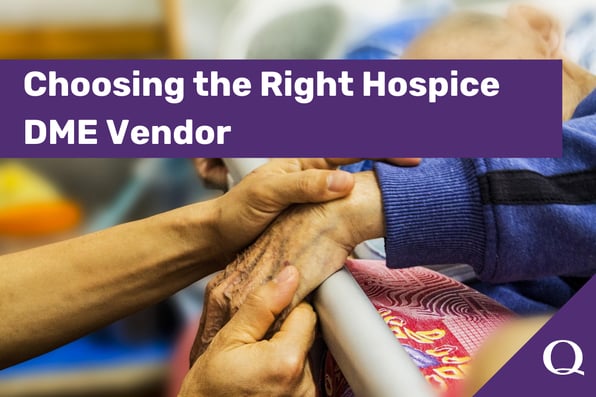Choosing the Right Hospice DME Vendor

Depending on many complicated factors, choosing a DME vendor can be either beneficial or costly in the running of your hospice. While it’s possible to enjoy a long-term relationship with a singular vendor, it often comes at the cost of flexibility and accountability. At the root, a good DME partner connects you with reliable, high-quality equipment, allowing you to prioritize what matters most: patient care and safety.
Why Vendor Choice Matters
Having the right medical equipment makes a big difference in a patient’s quality of life, especially in hospice care. But profitability for the business is just as important. It may be easiest to choose the DME vendor with the lowest prices, but that doesn’t guarantee timely deliveries, responsive customer service, or a wide selection of quality equipment.
In this context, making the wrong choice could make you dependent on a mismatched vendor relationship. It can also:
- Increase the risk of Medicare/Medicaid noncompliance
- Increase the frequency of slow deliveries
- Decrease efficiency
- Raise operational costs
Top Criteria to Evaluate Vendors
Your relationship with your DME vendor plays a key role in the success and growth of your hospice business. Ideally, they should take the guesswork out of DME management so you can focus more on patient care and safety. The next time you shop for a new DME vendor, take the following criteria into consideration:
Delivery Turnaround
DME approvals depend on proper documentation, insurance authorizations, and other administrative requirements, which can take up a lot of time. Because of this, timely deliveries are paramount for meeting the needs of your patients. Good hospice DME vendors will be transparent with their various performance metrics, including their delivery turnaround times.
Backorder Policies
Occasional backorders are to be expected in the competitive hospice care industry. However, DME vendors should provide notifications and updates when delays occur. During your vendor evaluation, ask about contingency plans, such as the availability of buffer stock or alternative products in case of shortages.
Training Protocols
Staff training isn’t just good for customer satisfaction. DME vendor employees should be up-to-date on regulatory and compliance standards, operational procedures, and available inventory. A knowledgeable staff is key for a true hospice DME partnership, which is basically guaranteed through effective training.
Geographic Reach
Location matters when it comes to DME deliveries. Vendors with a wider geographic reach can provide better access to care and tend to be more responsive to customer inquiries. This is particularly important for hospices with multiple locations.
Balancing Cost and Quality
When choosing a DME vendor, make a list of your organization’s priorities, placing quality and customer service at the top of the list. Low-quality equipment is prone to failure, which can end up costing you more through replacements and wasted hours.
Meanwhile, poor customer service may put patient safety at risk if your supplier doesn’t respond quickly to inquiries. As you conduct your DME evaluation, it’s helpful to review customer reviews and testimonials before you start looking at pricing.
Flexibility as a Competitive Advantage
Vendor-neutral DME partnerships give hospices the advantage, especially as they scale and expand. Staying locked in with a single vendor means that you’ll have no choice but to rely on their available stock and schedule. This gives you little recourse in case of missed or late deliveries or equipment quality issues.
On the other hand, access to a flexible network ensures your patients will always have the equipment they need, regardless of their location. Furthermore, DME suppliers tend to have more incentive to provide good value when hospices have multiple competitors to choose from.
Using Data in Vendor Selection
Balance customer testimonials with hard data to find the DME vendor that best meets the needs of your business. Here are the most important KPIs to request when choosing a new DME vendor:
- Delivery accuracy
- Order fulfillment rates
- Satisfaction surveys
Qualis’ Vendor-Neutral Model
Rather than signing a contract with the same vendor year after year, choose the option that gives you more control. Thanks to a robust DME vendor network, Qualis is the preferred partner for medical equipment and other business management services. True multi-vendor flexibility requires a national reach and transparent centralized reporting, which is why Qualis provides hospices with more value than single-vendor models.
Conclusion
A thoughtful vendor selection process protects both patients and the bottom line, allowing you to maintain your brand as a trusted hospice authority. Ultimately, the right DME vendor for you is the one that helps day-to-day operations run smoothly.
At Qualis, we tailor our solutions to the unique needs of each hospice partner, acting as a first line of defense for all DME-related tasks. Contact us to request a demo, explore our vendor partners, or browse our content library of whitepapers and ebooks. For more information about DME management, connect with the Qualis team today to discuss your vendor evaluation needs.

.webp?width=800&height=800&name=CAHPS-Whitepaper_Download%20(2).webp)


